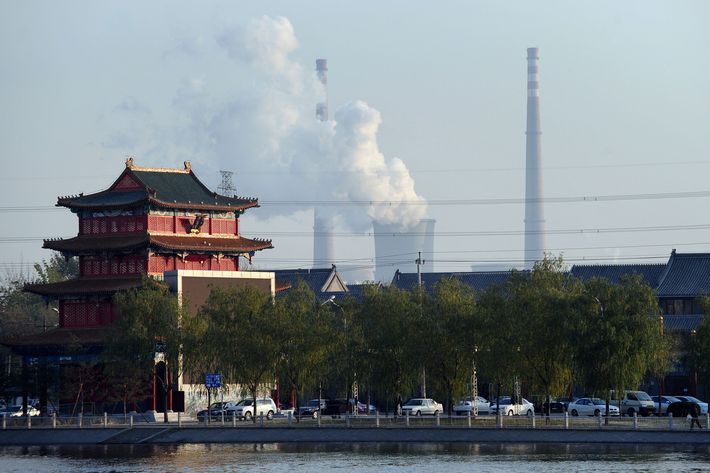
Humanity’s response to the threat of climate change, like just about every good thing humanity has ever done, is happening later than it should have. But the signs are everywhere that it is happening. My story in the magazine describes how political pressure and technological innovation are feeding into each other, producing a virtuous cycle of affordable green energy and stronger willpower to reduce emissions. The outlier in this story is the Republican Party, which stands apart from nearly the entire world, with the exception of petro-kingdoms like Saudi Arabia. Perhaps the most striking thing about the GOP’s strident opposition to international action is how little an impact world progress has had upon its policy stance. The rapid willingness of the rest of the world to reduce its emissions has merely redoubled the party’s commitment to destroy any cooperative structure to reduce emissions.
Denial of the theory of anthropogenic global warming represents the deepest and most obviously pathological strain of Republican thinking on climate change. But a denial of the possibility of international agreement holds nearly as important a place in the rhetoric of reaction. “If we could have a pact with other countries in which everybody would reduce their emissions, I would sign on,” the influential Republican pundit Charles Krauthammer put it last year. “In the absence of it, all that we’re doing is committing economic suicide in the name of do-goodism that will not do an iota of good.”
It is certainly true that reducing U.S. greenhouse-gas emissions would do little good if the rest of the world increases its own emissions. There is a collective action problem at work, with every country having an incentive to let others bear the costs of switching to cleaner energy sources. But Republicans have not treated the incentive to free ride off other countries’ clean-energy policies as a problem to be solved. Instead they have turned it into an immutable assumption that developing countries will never act.
The certainty that the world would do nothing to limit its emissions has served as the foundational assumption of every putatively serious conservative analysis of the issue. It provides the most important premise of the Chamber of Commerce’s loaded, deeply biased paper opposing the Obama administration’s carbon regulations. They have repeated this over and over:
Almost always, Republicans present the lack of international action as an a priori truth, so obvious it does not require defense. Very rarely do conservatives engage with the Obama administration’s strategy that, through diplomacy and reciprocal concessions, other countries can be coaxed into some kind of cooperative framework. On the rare occasions conservatives have even acknowledged this plan, they have used it as a punch line. “Mr. Obama’s logic seems to be that the U.S. should first set a moral example by imposing costs that reduce our prosperity,” scoffed a Wall Street Journal editorial in the wake of the Clean Power Plan. “This will then inspire China (8.7 billion tons), which produces and consumes nearly as much coal as the rest of the world combined, to do the same to its 300 million people who still live on pennies a day. Good luck persuading Xi Jinping.”
The exact sequence Obama tried to bring about has, in fact, happened. China has done the thing conservatives insisted it would never do. China’s carbon emissions, which not long ago were expected to keep rising until 2050, are now expected to peak by 2030 or even 2025. Republicans have reflexively discounted any future targets by insisting, as Mitch McConnell preposterously puts it, that China’s reduction commitments “[require] the Chinese to do nothing at all for 16 years.” (As if you can reduce your emissions in 16 years by doing nothing for the first 15.) Even if you completely discount any promises of future action, China has already undertaken massive structural energy changes. It has invested massively in green energy. Its coal use has dropped, as has the carbon intensity of its economy. If pledges to reduce future emissions don’t count as evidence that China is reducing its emissions, and actual results don’t count either, and policy changes that will bring about deeper results in the future also don’t count, one has to ask, what conceivable evidence could persuade Republicans?

The answer is revealed by the more recent turn in Republican strategy toward subverting international negotiations. The GOP is not hiding its intentions here. Republican leaders are openly advertising their gambit. Andrew Restuccia reports, “[A] top policy aide to McConnell (R-Ky.) has had conversations with a select group of representatives from foreign embassies to make it clear that Republicans intend to fight Obama’s climate agenda at every turn.” If Republicans were genuinely concerned about the U.S. imposing costs on itself while letting other countries free ride, they would not be doing this. They would be happy to allow other countries to reduce their own emissions. If, as they say, they could reverse Obama’s commitments after suckering the rest of the world into going first, all the better!
Why would Republicans try to persuade the rest of the world to keep pumping carbon dioxide into the atmosphere? One reason is that, while other countries transitioning to low-emission fuels may not cost American consumers anything, it definitely costs American fossil-fuel companies. People who own large deposits of coal and oil want to sell it abroad. The Republican climate-change strategy has been hatched by a group of Republican politicians and fossil-fuel lobbyists so tightly intermingled there seems to be no distinction between the interests of the two. (“In the early months of 2014, a group of about 30 corporate lawyers, coal lobbyists and Republican political strategists began meeting regularly in the headquarters of the U.S. Chamber of Commerce, often, according to some of the participants, in a conference room overlooking the White House. Their task was to start devising a legal strategy for dismantling the climate change regulations they feared were coming from President Obama.”) Beyond the straightforward self-interest of coal and oil companies, there is the ancient right-wing distrust of international agreements in general. Plus, of course, Republicans continue to follow a policy of across-the-board opposition to the whole Obama administration agenda. Destroying an international climate agreement means denying an Obama legacy; what more do they want?
In any case, the old conservative line, with its explicit or implicit promise that international agreement to reduce emissions might justify domestic emissions cuts, has suddenly become inoperative. The speed at which Republicans have changed from insisting other countries would never reduce their greenhouse-gas emissions to warning other countries not to do so — without a peep of protest from within the party or the conservative movement — says everything you need to know about the party’s stance on climate change.






























